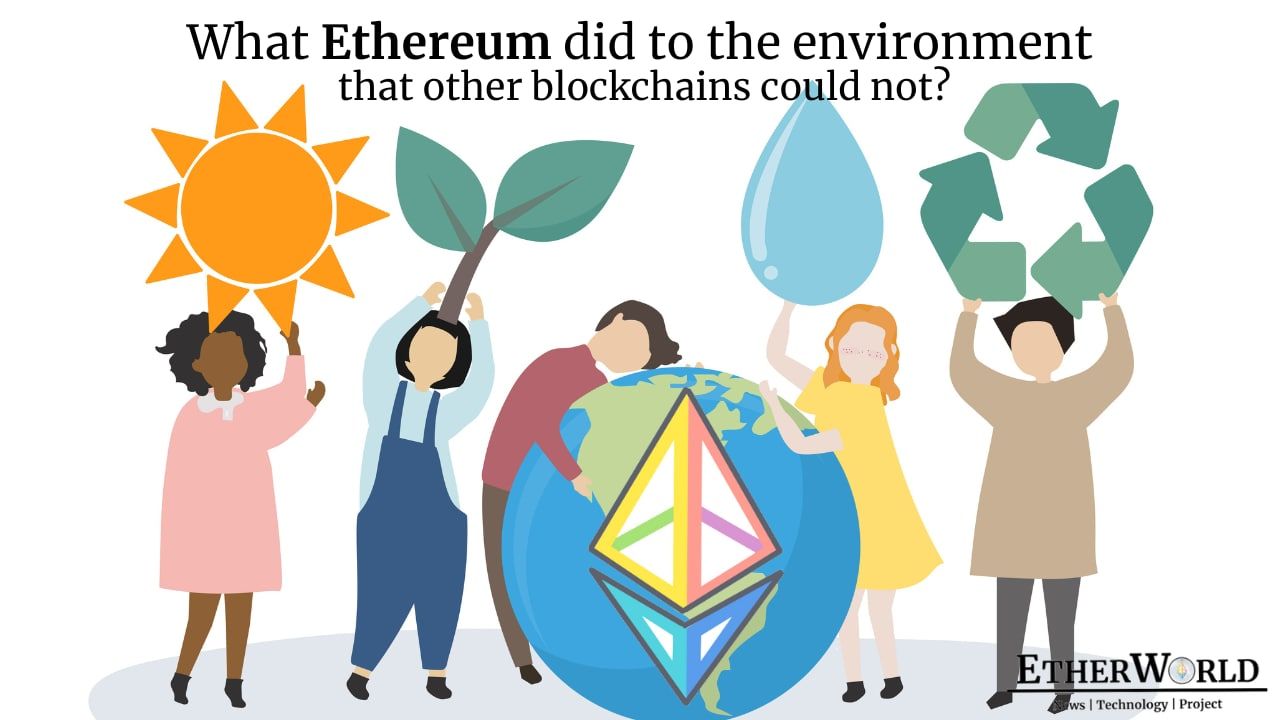Ethereum’s recent transition to Proof-of-Stake has left Bitcoin and many other cryptocurrency under scrutiny of the environment institutions. The latest research published last week by Scientific Reports states that “Bitcoin mining contributes as much to climate change as the beef or crude oil industry”. Environmental cost of mining digital currency is huge as it uses a heavy amount of electricity, which sometimes involve fossil fuels.
Ethereum has demonstrated a solution to this environmental damage. The network recently shifted to a more energy efficient and most- awaited consensus upgrade to Proof-of-Stake (PoS) from its previously existing Proof-of-Work (PoW). The Merge that was completed on 15th September has built a lot of expectations amongst environmentalists who are now demanding its contemporary Bitcoin to shift its mechanism too.
The Merge showed a hope for the blockchain technology to go greener. While setting the stage for future scaling, faster and cheaper transactions, it resulted in reducing Ethereum’s energy consumption. In September, Crypto Carbon Ratings Institute (CCRI) issued its latest report on The Merge. According to the report, the Merge leads to a reduction of the electricity consumption and carbon emission of 99.988% and 99.992% respectively.
The report analysed the electricity consumption and carbon emission pre and post- merge. It is found that the Merge reduces the annualized electricity consumption of the Ethereum network from 22,900,320 MWh to 2,600.86 MWh by over 99.988 %. Whereas, the carbon footprint is reduced from 11,016,000 tCO2e to 869.78 tCO2e which is a reduction by 99.992 %.
On the other hand, Bitcoin use of energy consumption is almost close to half-a-percent of overall electricity consumed in the world. The past 5 years data available at Cambridge Bitcoin Electricity Consumption Index reflects that the electricity consumption used by Bitcoin has increased by 10 times. Bitcoin’s resistance to adopting a greener way of mining so far has made environmentalists upset. It is important to talk about what PoW’s inability has caused the environment and will it ever be able to lose it’s dependence on fossil fules?
World’s response to cryptocurrency minning
With PoW in place, miners could validate the blocks of new transactions by solving computational puzzles. This is supposed to avert double-spending, and miners earn new tokens in return. The process of puzzle solving becomes complex at every stage to prevent too many new tokens from flooding the market. This process of mining leads to too much electricity consumption and leaves behind e-waste from the hardware they use to solve puzzles. This eventually pollutes the environment.
The environmental impact of crypto mining is a major concern in many countries, especially those dependent on fossil fuels for its energy consumption. According to latest data released by Cambridge Centre for Alternative Finance (CCAF)Fossil fuels accounted for 62.4% of the electricity used for mining Bitcoins as of January 2022. Several countries have banned mining of the cryptocurrencies either permanently or temporarily, specially during the winter or summer seasons when power demand is higher than usual.
China
China, who wants to lead the world by pledging to be carbon- neutral by 2060, more or less banned the mining of Bitcoin last year. But that has not solved anything. In 2021, Reports were that some Chinese- based miners moved to countries like the US or Kazakhstan. Many sold their mining equipment off to foreign buyers. This means that the Bitcoin miners are exploiting the resources wherever it is available and consuming the fossil fuels which are already limited.
United States
Researchers at the University of Cambridge said in its reports that China’s restrictions has resulted in dropping down of global Bitcoin mining to 46 percent in April to 75 percent in 2021. Meanwhile, the United States’ share of Bitcoin mining rose to 16 percent from 4 percent calculated during the same period.
Subsequently, New York has become a new destination for the miners who packed and moved from China. As a result Elizabeth Warren and other Democratic members of Congress sent a letter to two federal regulators. Members requested regulators to take action on the explosion of Bitcoin mining in the US. The letter expressed concern about the company’s energy usage and its impacts on the environment and consumers.The letter stated that the miners are already using a significant amount of electricity at presen and the companies that provided information indicated that they expect considerable increases in mining capacity and therefore electricity use in future years.
Is Proof-of-Stake a solution to a better blockchain ecosystem?
The Merge was welcomed by the environmentalists with open arms. While Bitcoin was criticised for still continuing to use more energy- hungry PoW. PoS is an alternative to this problem. It provides more autonomy to the validators and security to the network.
Ethereum Validator can be anyone with at least 32 ETH available to stake or pledge to the network. It does also allow validators with smaller amounts of ETH to participate through staking pools or cryptocurrency exchanges. This is the way that Ethereum Foundation thinks will make its network more than 99 percent energy efficient.
How the environment experts reacted?
As soon as Ethereum successfully shifted to PoS, environment organisations came up together to applaud the team and at the same time denounced Bitcoin.
Greenpeace
Nonprofit organisation Greenpeace USA said that
“Ethereum’s shift to less energy commitment has left Bitcoin as the largest cryptocurrency using an ‘outmoded high-energy’ proof of work consensus mechanism”.
The organisation has also warned to intensify its ‘Change the code, Not the Climate’ campaign in the coming time. The ‘Change the Code, not the climate’ campaign was started by nonprofits Greenpeace USA and Environmental Working Group.
Greenpeace has also launched a petition calling on Fidelity Investments to push bitcoin to follow ethereum’s footsteps to switch to an energy-saving protocol that has potential to reduce the cryptocurrency’s major contribution to the climate crisis. The 'Change the Code, Not climate’ campaign was launched in March. The aim was to uphold cryptocurrency to change its code to a more energy efficient way for the mining process.
Change the code not the climate
Michael Brune, director of ‘Change the code not the climate’ campaign praised Ethereum to show the lead to other networks to shift to greener ways of working with technology. Michael said,
Ethereum has shown it’s possible to switch to an energy-efficient protocol with far less climate, air and water pollution. Other cryptocurrency protocols have operated on efficient consensus mechanisms for years. Bitcoin has become the outlier, defiantly refusing to accept its climate responsibility.
Green Blockchain Ecosystem
MIT professor and founder of Green Blockchain Ecosystem Algorand, Silvio Micali congratulated Vitalik Buterin in a tweet. Micali said that the Ethereum team successfully made Ethereum greener without compromising on Decentralisation.
Ethereum did it. When will Bitcoin lead the way?
Ethereum’s move to proof-of-stake is the greatest example of technology making an effort to reduce their carbon footprint. It should be seen as a step forward to make technology greener, cheaper and environment- friendly.
As Leonardo Bautista Gomez explains,
The Merge is a perfect example of however difficult it is to technically implement it, efforts are being made to do this because we (Ethereum community) are conscious of our environmental responsibilities.
Gomez is founder of the blockchain research group Miga Labs, who has also worked with the Ethereum Foundation to help develop the Beacon chain.
Now that Ethereum has shown a way forward, other blockchains are also expected to equally demonstrate their commitment to a greener environment.
________________________________________________________Disclaimer: The information contained on this web page does NOT constitute financial advice or a solicitation to buy or sell any cryptocurrency contract or securities of any type. Trading is a high-risk activity. Readers are suggested to conduct their own research, review, analyze and verify the content before relying on them.
To publish press releases, project updates and guest posts with us, please email at contact@etherworld.co.
You've something to share with the blockchain community, join us on Discord!
Follow us on Twitter, Facebook, LinkedIn, Medium and Instagram.







